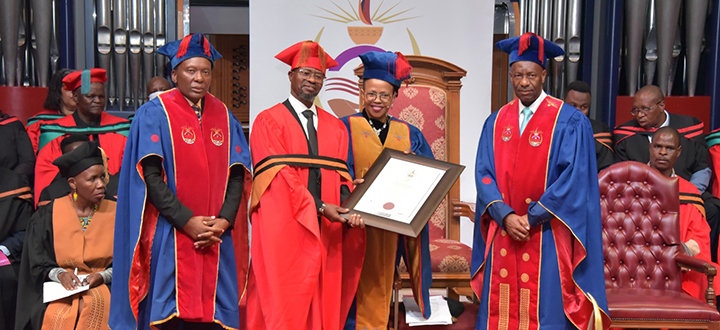College of Human Sciences
From explicit to implicit attitudes to accents

Prof. Pedro Álvarez-Mosquera (University of Salamanca) is a research fellow in Unisa's Department of Linguistics and Modern Languages.
The Department of Linguistics and Modern Languages in Unisa’s College of Human Sciences (CHS) invited Professor Pedro Álvarez-Mosquera of the University of Salamanca, Spain, and a research fellow in the department, to a colloquium where he presented his observations on the linguistic landscape of South Africa. His research seeks firstly to attain results on the implicit language attitudes towards English accents among L1 South African indigenous-language-speaking people, and, secondly, to understand implicit language attitudes among coloured students in Cape Town.
Álvarez-Mosquera told the colloquium how diverse and multilingual the country is. He indicated that, with English as a lingua franca, statistics inform us that only about 10% of the population are English native speakers. This meant that millions of South Africans express themselves in English with an accent.
The first presentation was on his examination of the role of social distant/contact in determining young L1 South African indigenous language speakers’ attitudes towards two language varieties historically associated with the white group in post-apartheid South Africa, what he called Standard South African English and Afrikaans-accented English.
His methodological approach combines IAT (Implicit Association Test) results on reaction times towards language inputs of the two varieties when associated with positive and negative traits. More specifically, participants reported on their linguistic background, social origins (including time living in every location/s), language exposure, type of education, and other social distance indicators in a post-IAT survey.
His results revealed that a number of sociolinguistic factors interfere with the overall negative perception of Afrikaans-accented English. In particular, more positive attitudes towards Afrikaans-accented English are correlated with three conditions that might lead to closer intergroup contact, which are, participants’ language range, the dominant languages spoken in their places of origin, and the type of school they have attended.
In the second presentation, Álvarez-Mosquera indicated his investigation of the implicit language attitudes of “young” coloured individuals towards English accents in the context of Cape Town.
In addition to demonstrating that the accents’ indexicality on its own can trigger statistically significant implicit positive attitudes towards Standard South African English speakers, Álvarez-Mosquera sought to shed some light on the role of a number of social variables in triggering or hindering such attitudes. To this end, he used a post-IAT sociolinguistic survey on participants’ linguistic background, language exposure, and intergroup social distance levels, among other social factors.
According to his findings, the sociolinguistic approach revealed that more positive attitudes towards Standard South African English are correlated with the dominant languages spoken in their places of origin and the social distance levels with the white group.
*By Katlego Pilane
Assistant Communication and Marketing Specialist
College of Human Sciences
Publish date: 2019-04-02 00:00:00.0

 Young Unisa doctoral graduate joins elite Lindau Nobel Laureate group
Young Unisa doctoral graduate joins elite Lindau Nobel Laureate group
 Education MEC addresses Unisa autism seminar
Education MEC addresses Unisa autism seminar
 Seven Unisans nominated for the NSTF-South32 Awards 2023/2024
Seven Unisans nominated for the NSTF-South32 Awards 2023/2024
 Unisa awards posthumous honorary doctorate to literary maven, OK Matsepe
Unisa awards posthumous honorary doctorate to literary maven, OK Matsepe
 From humble beginnings to academic leadership
From humble beginnings to academic leadership